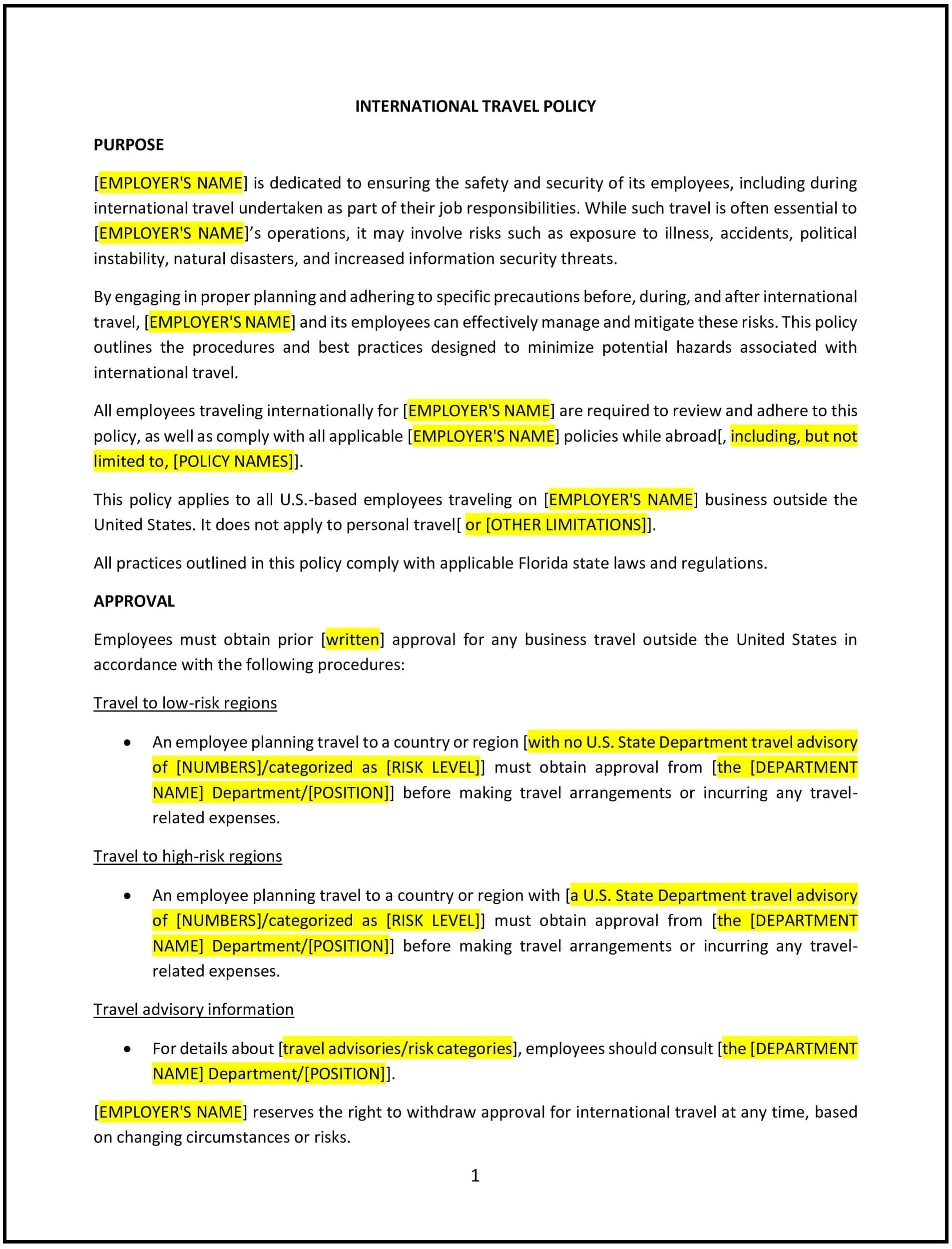International travel policy (Florida): Free template
Got contracts to review? While you're here for policies, let Cobrief make contract review effortless—start your free review now.

Customize this template for free
International travel policy (Florida)
An international travel policy helps Florida businesses establish guidelines for employees traveling abroad for work-related purposes. This policy outlines procedures for planning, approving, and managing international trips while addressing safety, security, and operational considerations. It is designed to promote preparedness, reduce risks, and provide clear expectations for employees and managers involved in international travel.
By implementing this policy, businesses in Florida can demonstrate their commitment to employee safety, enhance operational efficiency, and align with the state’s focus on supporting global engagement and responsible business practices.
How to use this international travel policy (Florida)
- Define approval processes: Clearly specify how employees should request and obtain approval for international travel, including required documentation and timelines.
- Address pre-travel preparations: Outline steps employees should take before traveling, such as obtaining visas, vaccinations, or travel insurance.
- Provide safety guidelines: Explain how employees should assess risks, stay informed about local conditions, and follow safety protocols during their trip.
- Specify expense management: Provide guidance on reimbursable expenses, spending limits, and submission requirements for travel-related costs.
- Include emergency procedures: Detail how employees should respond to emergencies, such as contacting local authorities, the nearest embassy, or the business’s emergency contacts.
- Communicate the policy: Share the policy with employees through handbooks, emails, or training sessions to ensure awareness and understanding.
- Monitor adherence: Regularly review travel activities and address any concerns or discrepancies promptly.
- Update the policy: Periodically assess the policy to reflect changes in travel risks, regulations, or business needs.
Benefits of using this international travel policy (Florida)
This policy offers several advantages for Florida businesses:
- Promotes safety: Clear guidelines help protect employees from risks associated with international travel, such as health hazards or political instability.
- Reduces risks: Defined procedures minimize the likelihood of travel disruptions, financial losses, or reputational damage.
- Builds trust: Demonstrates the business’s commitment to employee well-being and responsible travel practices.
- Aligns with community values: Reflects Florida’s emphasis on global engagement, innovation, and mutual support.
- Enhances reputation: A robust policy showcases the business’s dedication to ethical practices and operational resilience.
- Improves planning: Helps businesses anticipate potential challenges and incorporate contingency plans into travel arrangements.
- Supports growth: Facilitates participation in global markets by providing a clear framework for managing international travel.
Tips for using this international travel policy (Florida)
- Communicate clearly: Ensure employees understand the policy by providing written materials and discussing it during meetings or training sessions.
- Train employees: Educate staff on recognizing travel risks, following safety protocols, and managing expenses responsibly.
- Use technology: Leverage tools like travel management software to track itineraries, monitor risks, and manage expenses.
- Stay informed: Keep up with changes in travel advisories, visa requirements, or geopolitical developments that may affect international trips.
- Encourage feedback: Solicit input from employees to identify areas for improvement and ensure the policy meets their needs.
- Review periodically: Assess the policy’s effectiveness and make updates as needed to reflect changes in travel risks or business goals.